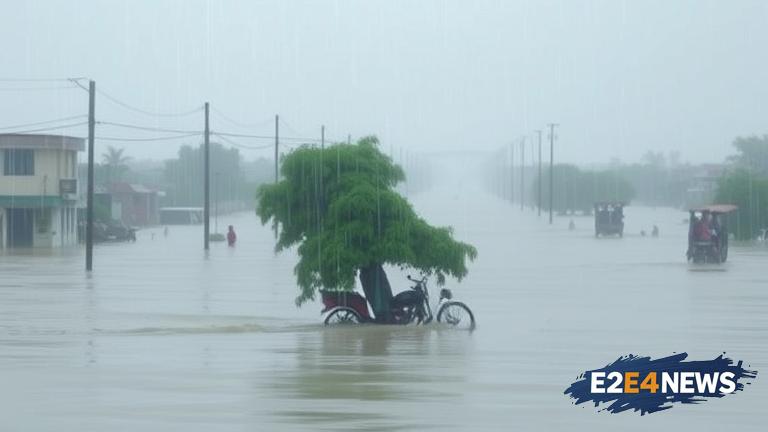Torrential rains have caused widespread devastation in northwest Pakistan, resulting in the loss of 17 lives within a span of 24 hours. The heavy downpour has led to flash flooding, landslides, and damage to infrastructure, leaving many without access to basic necessities. The affected areas include the provinces of Khyber Pakhtunkhwa and Punjab, where the rains have been particularly severe. The Pakistan Meteorological Department has issued warnings of further rainfall in the coming days, exacerbating the already dire situation. The authorities have been working tirelessly to provide relief to the affected populations, with rescue efforts underway to evacuate those stranded in flooded areas. The military has also been deployed to assist in the relief efforts, with helicopters and boats being used to reach remote areas. The government has announced plans to provide compensation to the families of those who have lost their lives, as well as to provide aid to those affected by the floods. The international community has also been urged to provide assistance to Pakistan in this time of need. The floods have also had a significant impact on the region’s agriculture, with crops and livestock being destroyed, leading to concerns about food security. The disaster has also highlighted the need for improved infrastructure and disaster management systems in the region. The Pakistani government has been criticized for its response to the disaster, with many arguing that more could have been done to prevent the loss of life and property. The floods have also had a significant impact on the region’s economy, with trade and commerce being disrupted. The disaster has also led to an outbreak of waterborne diseases, with reports of cholera and diarrhea emerging from the affected areas. The authorities have been working to provide medical aid to those affected, with mobile hospitals and medical camps being set up. The international community has also been providing medical aid and supplies to Pakistan. The floods have also had a significant impact on the region’s education system, with many schools being destroyed or damaged. The government has announced plans to rebuild and repair the damaged schools, with the aim of getting children back to school as soon as possible. The disaster has also highlighted the need for improved disaster preparedness and response systems in the region. The Pakistani government has been working to improve its disaster management systems, with the aim of reducing the impact of future disasters. The floods have also had a significant impact on the region’s environment, with reports of pollution and deforestation emerging from the affected areas. The authorities have been working to mitigate the environmental impact of the disaster, with efforts being made to clean up the affected areas and restore the natural habitats. The disaster has also led to an increased focus on climate change, with many arguing that the floods are a result of rising temperatures and changing weather patterns. The international community has been urged to take action to reduce greenhouse gas emissions and mitigate the effects of climate change.
